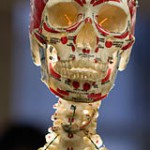Category Science & Technology
Annual Christmas chemistry show ‘sold out;’ TV still an option
As traditions go, nothing is more engaging on the Madison holiday scene than the annual holiday chemistry lectures by Bassam Shakhashiri.
Nanotech’s health, environment impacts worry scientists
The unknown human health and environmental impacts of nanotechnology are a bigger worry for scientists than for the public, according to a new report published Nov. 25 in the journal Nature Nanotechnology.
The Science of Cheese
UW-Madison cheese researcher Carol Chen explains the physics, chemistry and biology of cheese on Sicentific American’s Science Talk podcast.
UW-Madison scientists guide human skin cells to embryonic state
In a paper to be published Nov. 22 in the online edition of the journal Science, a team of University of Wisconsin–Madison researchers reports the genetic reprogramming of human skin cells to create cells indistinguishable from embryonic stem cells.
Reprogramming the debate: stem-cell finding alters ethical controversy
When University of Wisconsin–Madison researchers succeeded in reprogramming skin cells to behave like embryonic stem cells, they also began to redefine the political and ethical dynamics of the stem-cell debate, a leading bioethicist says.
Why does orange or grapefruit juice taste so nasty after I brush my teeth?
It’s all about phospholipids, says John Moore, director of the Institute for Chemical Education at UW–Madison. Not a flavor guy…
Bridging the divide between math and biology
As a mathematician who has navigated the field of biology for nearly a decade, mathematics professor Julie Mitchell has some sage advice for those who choose to follow. Never hesitate to ask a “dumb” question. Don’t be afraid to admit you don’t know something. Meanwhile, show some bravado.
Global engineering forum targets looming engineering shortage
The United States and the world face severe shortages of engineers by the year 2025, according to research based on U.S. Bureau of Labor data. The challenge of developing leaders in the changing engineering and technical workforce will be explored during the third annual University of Wisconsin–Madison Engineering Executives Forum.
Post-Kyoto environmental discussion to take place at UW–Madison
This December in Bali, new international talks will be launched to determine the successor of the Kyoto Protocol on Climate Change. The science has spoken. We know the problem is real, but how do we move forward with a solution?
Deep-sea drilling expedition off Japan seeks earthquake, tsunami causes
Harold Tobin is interested in deep scientific questions, whose answers lie thousands of meters underwater. The UW–Madison geologist studies deep oceanic earthquake faults, which extend miles into the Earth’s crust below the seafloor, to learn what causes earthquakes and tsunamis.
Tool-wielding chimps provide a glimpse of early human behavior
Chimpanzees inhabiting a harsh savanna environment and using bark and stick tools to exploit an underground food resource are giving scientists new insights to the behaviors of the earliest hominids who, millions of years ago, left the African forests to range the same kinds of environments and possibly utilize the same foods.
Recent sightings: Anatomy, labeled
Medical terminology identifies the features of a human skull on a teaching skeleton during a gross anatomy class lab in the Medical…
Curiosities: What determines the colors of the sky at sunrise and sunset?
Photo: Jeff Miller The colors of the sunset result from a phenomenon called scattering, says Steven Ackerman,…
Illustration: The ethical dimensions of global climate change
The two world maps schematically represent the contribution of different nations to global warming, as measured in atmospheric carbon output (top) and…
Computer scientist forges new line of defense against malicious traffic
Paul Barford has watched malicious traffic on the Internet evolve from childish pranks to a billion-dollar "shadow industry" in the last decade, and his profession has largely been one step behind the bad guys.
Two young researchers win White House science award
Two of the University of Wisconsin–Madison's most promising young faculty members have received the highest national honor bestowed upon scientists in the early stages of their careers. The Presidential Early Career Awards for Scientists and Engineers (PECASE) recognize top junior researchers who have demonstrated exceptional potential and leadership at the frontiers of science.
New classes explore environmental film’s mobilizing power
Gregg Mitman believes in the power of a well-told story. This semester the professor of history of science is teaching two new courses on the environment from a cinematic perspective: a class on environmental film in history and a hands-on production class in documentary storytelling.










